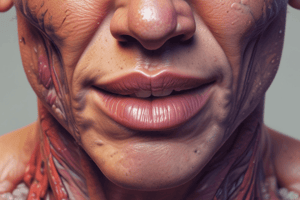Podcast
Questions and Answers
The eyes are usually positioned in the middle of the face horizontally, with the distance between them being roughly equal to the width of one ______.
The eyes are usually positioned in the middle of the face horizontally, with the distance between them being roughly equal to the width of one ______.
eye
The nose typically extends from the area between the eyes down to the bottom of the face, with its width varying greatly among ______.
The nose typically extends from the area between the eyes down to the bottom of the face, with its width varying greatly among ______.
individuals
Cheekbones can be high or low, and their prominence varies among ______.
Cheekbones can be high or low, and their prominence varies among ______.
individuals
The chin can range from prominent to recessed, with varying degrees of ______.
The chin can range from prominent to recessed, with varying degrees of ______.
The mouth is often located centrally beneath the nose, with the width of the mouth roughly equal to the width between the pupils of the ______.
The mouth is often located centrally beneath the nose, with the width of the mouth roughly equal to the width between the pupils of the ______.
Match the following carpentry tools with their primary usage:
Match the following carpentry tools with their primary usage:
Match the following carpentry tools with their primary usage:
Match the following carpentry tools with their primary usage:
Match the following carpentry tools with their primary usage:
Match the following carpentry tools with their primary usage:
Match the following carpentry tools with their primary usage:
Match the following carpentry tools with their primary usage:
Match the following carpentry tools with their primary usage:
Match the following carpentry tools with their primary usage:
Match the following carpentry tools with their primary usage:
Match the following carpentry tools with their primary usage:
Match the following hand tools with their primary function:
Match the following hand tools with their primary function:
Match the following hand tools with their primary usage:
Match the following hand tools with their primary usage:
Match the following hand tools with their characteristics:
Match the following hand tools with their characteristics:
Match the following hand tools with their usage techniques:
Match the following hand tools with their usage techniques:
Match the following hand tools with their associated tasks:
Match the following hand tools with their associated tasks:
Match the following hand tools with their specific usage:
Match the following hand tools with their specific usage:
Study Notes
Measuring Tools
- Measuring tools are used to measure accurate dimensions and layouts
- Pull-push rule: a versatile tool used for measuring lengths, widths, and thickness
- Ruler: a straight-edged strip used for drawing straight lines and measuring lengths
- Ruler is 12 inches graded and used for measuring small stocks
Tooth Cutting Tools
- Tooth cutting tools are designed for tooth cutting across and along the grain of wood
- Cross-cut saw: a common tooth cutting tool used for making precise and clean cuts angle across the grain
- Use a steady and controlled motion for optimal results
Lining Tools
- Lining tools are essential for marking guidelines on surfaces
- Pencil: a simple yet effective tool used for marking measurements and layout lines
- Keep the pencil sharp for precision and replace as needed
- Chalk line: a string impregnated with powdered chalk used to mark a straight line on a surface
- Marking gauge: a wood or metal tool used to mark a line parallel to the grain of the wood
Driving Tools
- Driving tools are essential for affixing materials together
- Claw hammer: a universal tool used for driving nails and removing them
- Hold the claw hammer near the end for better control for striking and pulling out the nail
- Screwdriver: a tool used for turning screws with slatted heads
- Mallet: made of wood or rubber, used to drive other tools like chisels
- Ball Peen Hammer: a type of peening hammer with 2 ends, one shaped like an ordinary hammer head and the other ball-shaped
Boring Tools
- Boring tools are crucial for creating holes in various materials
- Hand drill: a tool used to create holes in various materials
- Ensure the drill bit is sharp, and maintain a steady pace and pressure while drilling
Testing Tools
- Testing tools help ensure accuracy and squareness in work
- Squares: indispensable for checking and maintaining the squareness of the workpiece
- Try square: a type of square used to check and maintain the squareness of the workpiece
- Other testing tools: miter square, spirit level, and laser point
Edge Cutting Tools
- Edge cutting tools are vital for refining surfaces
- Hand plane: a versatile tool used to smooth and shape wooden surfaces
- Adjust the blade depth of the blade cut for desired thickness, and work in the direction of the grain for optimal results
- Chisel: a metal with a sharp beveled edge used to cut and shape stone, wood, or metal
- Spoke shave: a small plane-like tool used for shaping irregularly shaped objects
Studying That Suits You
Use AI to generate personalized quizzes and flashcards to suit your learning preferences.
Description
Test your knowledge on common human facial features and their typical proportions. Learn about the position of eyes, size, shape, and distance apart, as well as the proportions of the nose, mouth, and other facial features.




